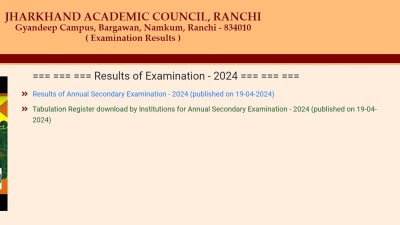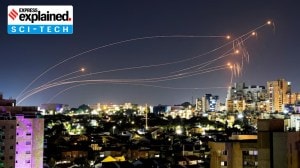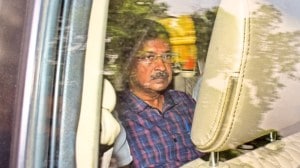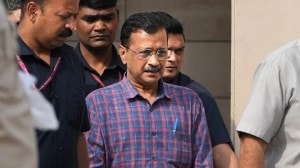- India
- International
Halted by sealed Delhi-Gurgaon border: Doctors, health staff, crucial surgeries
With the Delhi-Gurgaon border sealed starting Friday morning, healthcare workers who live in the two cities were among those who found themselves stranded.
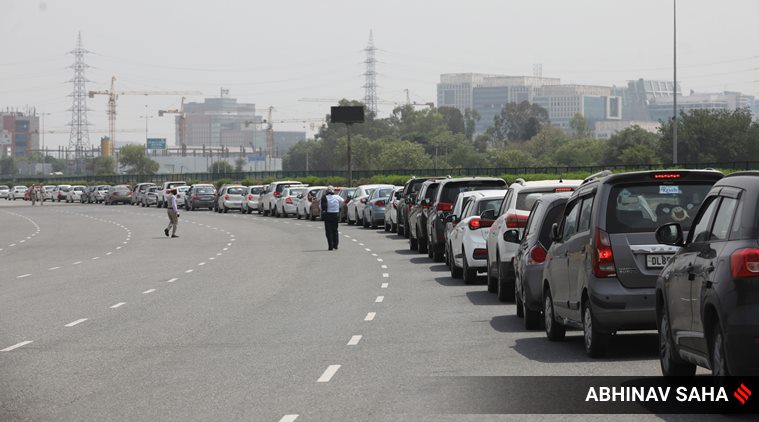 A long queue of vehicles at the NH-8 border-crossing on Friday, first day of sealing.
A long queue of vehicles at the NH-8 border-crossing on Friday, first day of sealing.
On Thursday night, cancer surgeon Dr Mandeep Malhotra had to reschedule a surgery for a patient suffering from throat cancer after he realised he won’t be able to make it to Fortis Hospital in Vasant Kunj from his Gurgaon residence the next morning.
Dr Tariq Matin, a Delhi-based neuro-interventionist, had to postpone a procedure too as he couldn’t make it to Narayana Superspeciality Hospital in Gurgaon.
Read| 33% population in red zone, 43% in orange
With the Delhi-Gurgaon border sealed starting Friday morning, healthcare workers who live in the two cities were among those who found themselves stranded. Apart from the long queues at border checkpoints, healthcare workers said they had to deal with police personnel, who didn’t let them pass despite their ID cards and explanations regarding the urgency of their work.
The Gurgaon authorities have directed that those working there and living in Delhi and vice-versa should make living arrangements at or near their workplaces to avoid cross-border movement.
Malhotra told The Indian Express, “I have been with this patient for two months and this surgery is important. I can delay a day or two, maybe even a week, but beyond that all our work will be undone and the cancer can progress.”

He said the hospital has given them accommodation to stay back in Delhi, but he cannot as his aged grandmother and two young children stay with him. “One can stay away from home for two-three days but this is indefinite,” he said.
Malhotra said even patients are in trouble as many cross the border for treatment. “I have a Gurgaon-based patient who got operated on for breast cancer. Now she needs post-surgery radiation. I asked her to get it done at a hospital in Gurgaon, but it turns out that a lot of its staffers live in Delhi, so her post-surgery radiation has not been scheduled.”
At 7.30 am Friday, Dr R K Agarwal (58), senior consultant, anesthesia, at Sir Ganga Ram Hospital, left his Gurgaon residence for work and reached in no time. On his way back in the afternoon though, he found himself pleading with police. “I work in a COVID hospital and, as an anesthetist, I work with ventilators, which are crucial right now. I showed the police personnel my ID card, a letter from the hospital saying this a COVID hospital, but he just didn’t listen. I felt humiliated. The AC in my car too wasn’t working and I told the policemen that I am tired, I am ageing and that they should let me go. I left the hospital at 1.30 pm and finally reached home at 4.45 pm,” said Agarwal. He said he is “fearful of going to work in the coming days”.
Gurgaon-based Dr Ajay Singhal, head of department of anesthesia at Primus hospital in Delhi’s Chanakyapuri, said he didn’t go to work after he found out on Thursday that the border had been sealed. “Thankfully, we have Delhi-based anaesthetists… How can they expect us to make accommodation arrangements in Delhi?”
Matin, the neuro-interventionist at Narayana Superspeciality Hospital, said that 40% of the Gurgaon hospital’s healthcare workers live in Delhi, and could not come to work Friday. “The nephrology unit is shut… Dialysis is very important. Other healthcare services shouldn’t suffer like this,” he said.
Gurgaon-based Dr Anurag Gupta, a neurosurgeon at Fortis Vasant Kunj said: “NCR has always been one unit, and this sealing has made our life very tough. I am the only neurosurgeon at the hospital. I have asked a Fortis Gurgaon neurosurgeon who lives in Delhi to cover for me. My wife works at Fortis Gurgaon and several heads of department and the director have been unable to come because they live in Delhi.”
A doctor with a private hospital in Delhi, who did not wish to be named, said she and her husband, also a doctor, reached the NH-8 toll plaza on the Delhi-Gurgaon border around 2 pm after completing their shifts and found a long queue of cars. “We knew that the order was coming into effect today so we left a little early to reach Gurgaon, where we live with our three-year-old son. We had to wait for two hours in the traffic before we reached the checkpoint, where we showed our hospital IDs and state government-issued passes, but police told us that they cannot allow us to pass,” she said.
“There were 15-20 doctors besides us. Police also threatened an FIR against us. After much pleading, they finally let us go, with a warning that this was being done only for today and if we return without valid passes tomorrow, we should be ready to face charges,” the doctor said.
Another doctor with Medanta Hospital in Gurgaon, who was on his way to work from Delhi, said he told police officials that he worked in an ICU and had valid passes. “They said only those with Central government passes would be allowed to go through,” the doctor said.
G K Khurana, secretary general of the All India Government Nurses Federation, said: “Additional restrictions are causing problems in the movement of healthcare workers, many of whom have called us. Authorities should either allow their movement or make arrangements for their stay near their places of work.”
Dr Arjun Dang, CEO of Dr Dangs Lab, said: “Diagnostic staff conducting coronavirus tests are facing difficulties due to shortage of manpower owing to transport issues.”
Dr Ritu Garg, zonal director of Fortis Memorial Research Institute in Gurgaon, said while restricting movement across the border may help reduce transmission, “we also need to ensure medical assistance to patients on chemotherapy, dialysis and with other medical emergencies”.
A spokesperson for Max Healthcare, which has hospitals in both Delhi and Gurgaon, said nearly 40% of their clinical, para-clinical and support staff travel between Delhi, Gurgaon and Faridabad. “Sealing at borders is forcing us to operate with limited manpower… Despite ID cards and passes issued by Delhi for healthcare workers, they are being stopped,” the spokesperson said.
“We are trying to make arrangements for accommodation for mandatory essential staff in Delhi but that is another challenge with most hotels and accommodation facilities non-operational… Arranging transportation is another hassle,” the Max Healthcare spokesperson said.
Apr 19: Latest News
- 01
- 02
- 03
- 04
- 05











